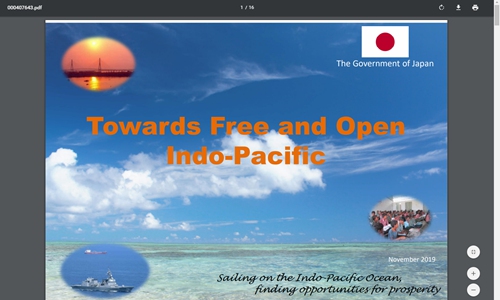HOME >> OPINION
With security as the core concern, Japan seeks help in quartet alliance
By Xue Li Source:Global Times Published: 2019/12/30 20:59:19

The photo is a screenshot of a PDF titled "Towards Free and Open Indo-Pacific" published on the official website of Japan's Ministry of Foreign Affairs.
The world is now entering a new period of peaceful competition among different civilizations. A rising China should know other countries better, and Japan is one of them. It is important to deepen people's understanding of Japan through its foreign policy.
Japan has a clear strategy for its diplomacy: Since it cannot compete with China on its own, comprehensive steps on politics, security, economy and culture need to be taken.
Politically, Japan doesn't recognize China's political system and political value. It recognizes itself as part of the West. Thus, it creates the "Arc of Freedom and Prosperity" alongside eastern, southern, and southwestern China.
Economically, Japan set its Economic Partnership Agreement as the focus to promote relations with other countries. In order to counter China's influence, Japan also participates in ASEAN Plus Six, the Trans-Pacific Partnership (TPP) and the Comprehensive and progressive Agreement for Trans-Pacific Partnership (CPTPP). Moreover, its dithering on the Regional Comprehensive Economic Partnership (RCEP) and limited support for the China-proposed Belt and Road Initiative reflect its fear of China as well.
Culturally, Japan has strong faith in itself as a tourist magnet. Besides its influential animation and cuisine, some NGOs also take the responsibility to promote Japan worldwide. For example, the Japan Foundation holds travel exhibitions and Japanese film screenings overseas. Under their joint efforts, Japan's cultural diplomacy has achieved great success. Japanese passport holders can access 189 countries visa-free. Besides, with its attractive tourist spots, Japan is also one of the top destinations for travelers to revisit.
Security is the core concern of Japan's "Free and Open Indo-Pacific Vision." Japan worries about the rise of China, believing that in order to restrain the regional powerhouse, the rebalance to Asia-Pacific strategy should be expanded to the Indo-Pacific. Therefore, Japanese Prime Minister Shinzo Abe announced his "Free and Open Indo-Pacific Strategy" in 2016, intending to develop cooperation with countries which share the same values with Japan in the Indo-Pacific region, such as US, Australia and India. It seems that Japan is much keener on its quartet alliance than the others.
But this four-way alliance does not achieve much by way of Japan's efforts to strike a rebalance to Indo-Pacific strategy. First, even though US military is interested in the alliance, US President Donald Trump who emphasizes "America First" cares much less about it. While, as for India which pursues a foreign policy of non-alignment and strategic autonomy, it does not want to be used by other countries as a tool to go against China. For example, India kept Australia out of the 2018 Malabar trilateral naval exercise among the US, Japan and India. Australia is interested in the alliance but it worries about its economic relations with China even more.
ASEAN members do not want to choose a side between China and the US, which is the reason why they are reserved about Japan's Indo-Pacific strategy. In November 2018, in light of improvement in China-Japan relations and factoring in ASEAN, Japan started to use the term "Free and Open Indo-Pacific Vision" to refer to "Free and Open Indo-Pacific Strategy."
Japan is also not against forming a so-called Asian version of NATO through military cooperation with the US and South Korea. Yet the Asian version of NATO will hardly be realized in the foreseeable future, because South Korea even announced in August to scrap the General Security of Military Information Agreement (GSOMIA) with Japan, although it eventually made a last-minute decision to renew the deal in November.
Whether it is the "Free and Open Indo-Pacific Strategy" or the "Free and Open Indo-Pacific Vision," the main target of Japan's Indo-Pacific foreign policy is China. By making friends with other stakeholders, Japan can maintain its influence, make gains and balance China at the same time.
The author is director of the Department of International Strategy at the Institute of World Economics and Politics under the Chinese Academy of Social Sciences. opinion@globaltimes.com.cn
Posted in: ASIAN REVIEW